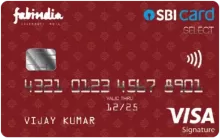SBI Card Miles Prime
SBI has introduced three types of ‘MILES’ cards: SBI Card MILES, MILES PRIME, and MILES Elite, all designed to benefit people who travel frequently. The SBI Card Miles Prime is especially for regular travelers. It has a joining and renewal fee of ₹2,999 plus GST. If cardholders spend ₹60,000 within the first 60 days of getting the card, they’ll earn 3,000 Travel Credits.
This card also offers helpful travel insurance, which covers things like flight cancellations and lost baggage. Plus, it protects users from any fraudulent transactions, meaning they won’t be held responsible for any unauthorized charges. Although there’s an annual fee, the card’s option to waive the fee based on spending and the special travel benefits make it a good choice for frequent travelers.
On top of that, the card gives free access to both domestic and international airport lounges, so travelers can enjoy a comfortable start to their trip. It also works with over 20 well-known airlines and hotel chains, including Air Vistara, Air India, SpiceJet, Air France-KLM, Etihad Airways, Air Canada, Thai Airways, Qantas Airways, ITC Hotels, IHG Hotels & Resorts, and Accor.
Rewards and Benefits
Fees & Charges
What should you consider before applying for a credit card in India?
Before applying for a credit card in India, consider the following factors:
- Eligibility Criteria: Check the age, income, credit score, and employment status requirements set by the bank or financial institution.
- Credit Score: A higher credit score increases your chances of approval and may result in better offers. Ensure your credit score is in good standing.
- Interest Rates and Fees: Compare annual percentage rates (APR), processing fees, late payment penalties, and foreign transaction fees. These can vary significantly between cards.
- Rewards and Benefits: Look for cards that offer rewards, cashback, discounts, or other perks that align with your spending habits.
- Credit Limit: Make sure the credit limit offered is in line with your financial needs. Avoid over-borrowing, which can lead to high-interest charges.
- Repayment Terms: Understand the repayment options, minimum payment amount, and due dates. Consider how easily you can manage timely payments to avoid interest accumulation.
- Card Type and Features: Choose a card type (e.g., standard, premium, travel, etc.) based on your requirements. Some cards offer more benefits for specific categories like travel, shopping, or dining.
- Bank’s Reputation: Opt for a bank with a good track record of customer service and transparency. Read reviews and consider their customer support accessibility.
- Hidden Charges: Be aware of any hidden fees, such as annual fees, balance transfer charges, and cash withdrawal fees.
- Credit Utilization: Ensure you can manage your spending within the credit limit to maintain a healthy credit utilization ratio, which impacts your credit score.
- Long-Term Financial Plans: Think about how the credit card will fit into your long-term financial goals and avoid accumulating unnecessary debt.





Leave a Reply